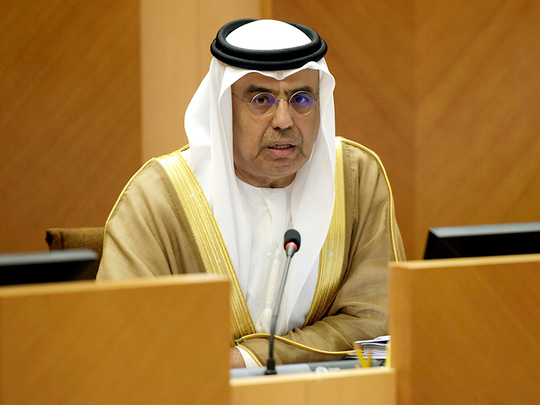
Abu Dhabi: There will be no increase in salaries to cope with the levying of the value added tax (VAT), Obaid Humaid Al Tayer, State Minister for Financial Affairs, told the Federal National Council on Tuesday.
Al Tayer said the tax will have minimal socio-economic impact on people and investments. “The Impact on current, future investments in the country is expected at 0.68%,” Al Tayer said, adding VAT aimed at "achieving financial sustainability" for government.
Implementation
The minister was answering questions about the implementation of VAT from the beginning of next year.
Al Tayer said there will be no delay of implementation for any businesses, saying banks and other big businesses have systems that can deal with VAT, they just need to activate these systems.
“No company will be given more time to start VAT implementation, nor any company will be exempt from VAT,” Al Tayer said.
Members of the Federal National Council raised with Al Tayer the concerns of residents and businesses over VAT, set to be levied from January 1, 2018.
Dr Saeed Abdullah Al Mutawa, a member from Sharjah, put two questions on the impact of VAT on the national income and the Government’s plan to offset inflationary effects of the tax and whether salaries of employees will be increased.
VAT from Januray 1, 2018
The UAE will be levying VAT from the beginning of next year. The rate of VAT will be 5 per cent.
The House, however, passed a motion to offset the impact of VAT on beneficiaries of social security and pensioners, to help them cope with the social and economic impact of the tax.
The country’s average inflation rate was 4 per cent in 2015. The inflation rate is expected to be around 2.5 per cent this year given the firming US dollar and a decline in imported items coupled with the slowdown in transportation and housing rents.
VAT will provide the UAE with a new source of revenue, which will continue to be utilised to provide high-quality public services. It will also help the Government move towards its vision of reducing dependence on oil and other hydrocarbons as a source of revenue.
VAT, as a general consumption tax, will apply to the majority of transactions in goods and services. A limited number of exemptions may be granted.
As a result, the cost of living is likely to increase slightly, but this will vary depending on an individual’s lifestyle and spending behaviour.
Hamad Ahmad Al Rahoumi, a member from Dubai, put three questions on banks’ demands to delay levying of VAT and change in retirement laws to give Emirati pensioners annual inflation-linked rises.
The Government requires businesses to be clear about how much VAT an individual is required to pay for each transaction. Based on this information, individuals can decide whether to buy something.
Information
Marwan Ahmad Bin Galita, First Deputy Speaker of the House, put a question on educating members of the public about the new tax.
The introduction of VAT could push the cost of living and cost of doing business higher in the Gulf Cooperation Council (GCC) region, according to investment professionals and finance experts.
A VAT rate of five per cent could help generate additional revenue equivalent to about 1.5 per cent of the country’s gross domestic product, according to International Monetary Fund (IMF) estimates.
Other experts, however, say VAT will decrease the consumer purchasing power and hence suppress demand, and thus be anti-inflationary. Whether the introduction of VAT will increase inflation or not, however, depends on other factors such as economic growth and interest rates, they say.
The House will also review the 2018 budget, approved by the Cabinet last month.
A record Dh51.4 billion federal budget for next year was approved with a focus on education, health care, and community wellbeing. Over the next four years, a total budget of Dh201.1billion has also been approved.












